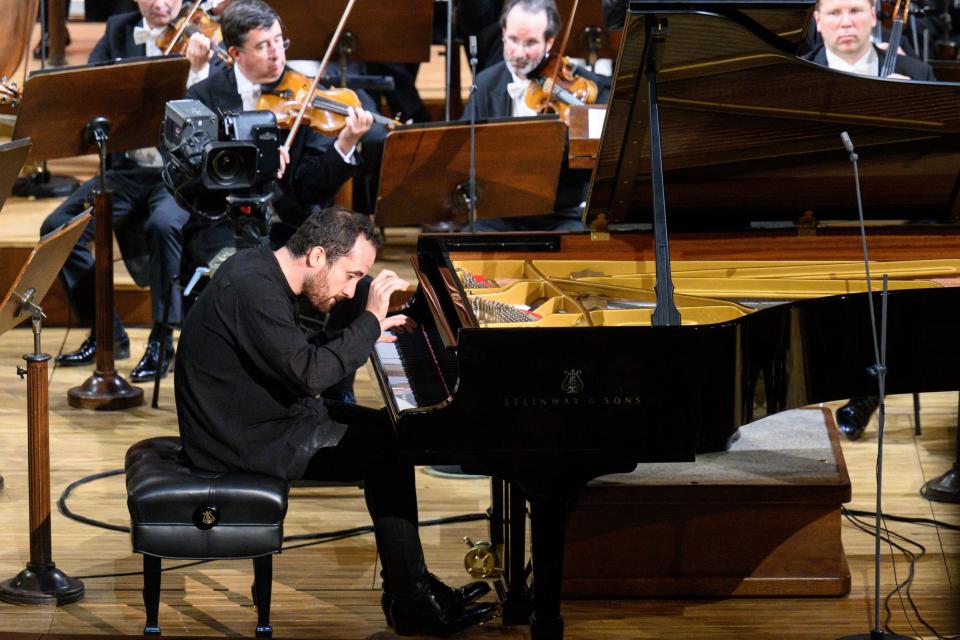Pianist Igor Levit on anti-Semitism: ‘People keep telling me they want to deport me’

On October 7, the renowned German-Jewish pianist Igor Levit – who at 36 has just become the youngest ever recipient of the prestigious Wigmore Hall Medal – was relaxing with a friend when he heard that something terrible was happening in Israel.
“We turned on the television and watched the whole drama unfold,” he tells me down the line from his home in Berlin. “Over the next few hours, the news got worse and worse. And then, on October 8, I took a flight to Los Angeles to perform, when it felt as if everything was still unfolding in slow motion.”
It’s typical of Levit that, upset though he was, he honoured his commitment to play with the Los Angeles Philharmonic. Levit, who loves to scale the heights of masterpieces – the more titanic the better – is regularly compared with such past giants as Artur Schnabel. A recent documentary about him for German television suggested that, when not travelling or in a hotel room, Levit is always practising. Unsurprisingly, perhaps, he has no partner or family.
However, he’s not completely austere. Levit makes time for friends and exchanging jokes, and in October he certainly needed those friends.
“It was a terrible week, but I had work to do preparing Gershwin’s Piano Concerto, which was a positive distraction,” he says. “My dear friend Elim Chan was conducting and she gave me a shoulder to cry on. And also I met a most wonderful young rabbi in Los Angeles, who encouraged me to go to a service. I’m not an observant Jew, but that was a very beautiful moment. And I began to realise that this event was a 180-degree turning point for me.”
For my people pic.twitter.com/fEZdMhzuwr
— Igor Levit (@igorpianist) October 30, 2023
In what way? “I don’t mean politically, I mean personally, in my life as a Jewish person. In life, I believe there is generally no such thing as black and white, but that event itself was certainly a black and white moment.” Levit sighs, as if remembering the enormity of that moment. “This is a brutal attack against my people, done with the ultimate goal that Hamas has always been open about, which is the total annihilation of the Jewish people worldwide, not just in the state of Israel.”
Levit is the child of Russian parents who emigrated to Hanover, in Germany, when Levit was only eight years old. The boy set about the task of making himself into a German with the same iron determination that marked his musical studies. “I fell in love with the German language and learnt it lightning-fast. Language was a tool to become part of the country, and I was determined to speak German in the most refined and sophisticated way possible.” That emphasis on precision, combined with passion, is precisely what marks his playing, and even on a bad phone line, I can feel his efforts to find exactly the right phrase in English. “It was only when I started to have a career as a pianist, over 10 years ago, that I first became aware of anti-Semitism directed against me personally,” he tells me.
Does he recall any particular incident? “Well, I remember someone once told me that I should never forget that although I grew up in Germany and I lived in Germany, I belonged to a group of people who are not supposed to be there any more. There were a few things like that.”

Faced with that kind of hostility, some artists would keep their heads down and just focus on their art. Not Levit. He became a public figure, debating the rise of anti-Semitism in Germany on television with the federal president, no less; and during the lockdown, broadcasting a series of 53 concerts from his studio, which won him a huge global following. Unsurprisingly, he’s faced more attacks in recent months. “Just in the past few days, I’ve received around 20 messages from people saying they want to deport me,” he says with extraordinary matter-of-factness. “And this is bound to happen, because these people now feel strong and emboldened, because of the rise of what I would call a Nazi, fascist party, which has declared it wants to deport millions of immigrants.”
I notice Levit doesn’t actually want to name the AfD (Alternative für Deutschland), as if the name sickens him too much. He adds, with some bitterness, “And if you as a democrat believe in the principle of a free society with universal human rights, but at the same time you know that about 20 per cent to 30 per cent of your own people are willing to vote for neofascism, then of course your life is bound to get worse.”
Though one senses Levit’s disappointment in his beloved adopted country, he has no qualms about Germany at the official level. “I am glad to say that the German government has displayed a very credible and trustworthy response to this rise of the extreme Right-wing. They have made a very clear statement against anti-Semitism.” One solution is surely to leave. Levit admits that one “dear friend” of his has already left, but refuses to do so himself, because, as he points out, there is anti-Semitism everywhere. “I say to my friends who are not a member of any minority, if you guys believe in democracy and you let your country get to the point where someone like me, or a member of any other minority, has to flee, then you had better run yourself. Defending me means defending everyone.”
Levit says that the rise of the Right is a problem for all immigrants, but can he sympathise with Muslims in Germany, whom the AFd is specifically targeting? “I have wonderful friends who are Muslims, with whom I am in touch frequently,” he says, without hesitation. “We have to acknowledge each other’s pain, and not fall into a kind of competition about who is suffering more.” But this sympathy doesn’t blind him to another problem we are familiar with in Britain.
“We have this rise of very dangerous radical Islamic movements, which is bringing out not just anti-Semitism but a contempt for the entire society we live in. I would say it is a symptom of the intellectual derangement of part of the progressive Left, which unfortunately has been met with silence or non-reaction on the part of the majority.”
When it comes to the Israeli government’s handling of the conflict, Levit refuses to be drawn. “I do not like to speak about things about which I don’t have enough knowledge. The world is full of so-called experts who studied at the university of TikTok, and I’m not willing to join them. All I can do is speak out against anti-Semitism, and also help the pain of my people through music. I have been to Israel to play for people in an old people’s home, where there were survivors of both October 7 and the Holocaust; I went to a hospital to play for victims; and I gave a concert for parents of hostages.”
Levit’s latest musical offering to his people is a recording of works by Felix Mendelssohn and Charles-Valentin Alkan, two Jewish-born composers. “In October, I gave two concerts in Berlin to raise money for two wonderful Jewish charities,” he says, “both supporting the fight against anti-Semitism, and afterwards I thought, why not make an album to raise money, as well? My recording company, Sony, agreed, and everyone gave their services for free. It’s my way of responding artistically to the terrible events of the past few months.”
Igor Levit’s new recording of Mendelssohn and Alkan is released on Sony Classical


